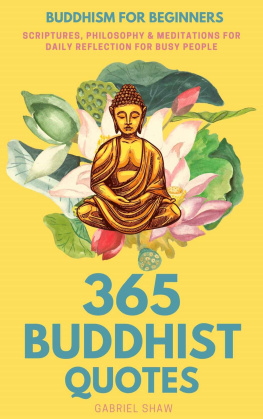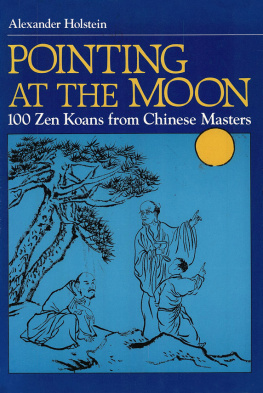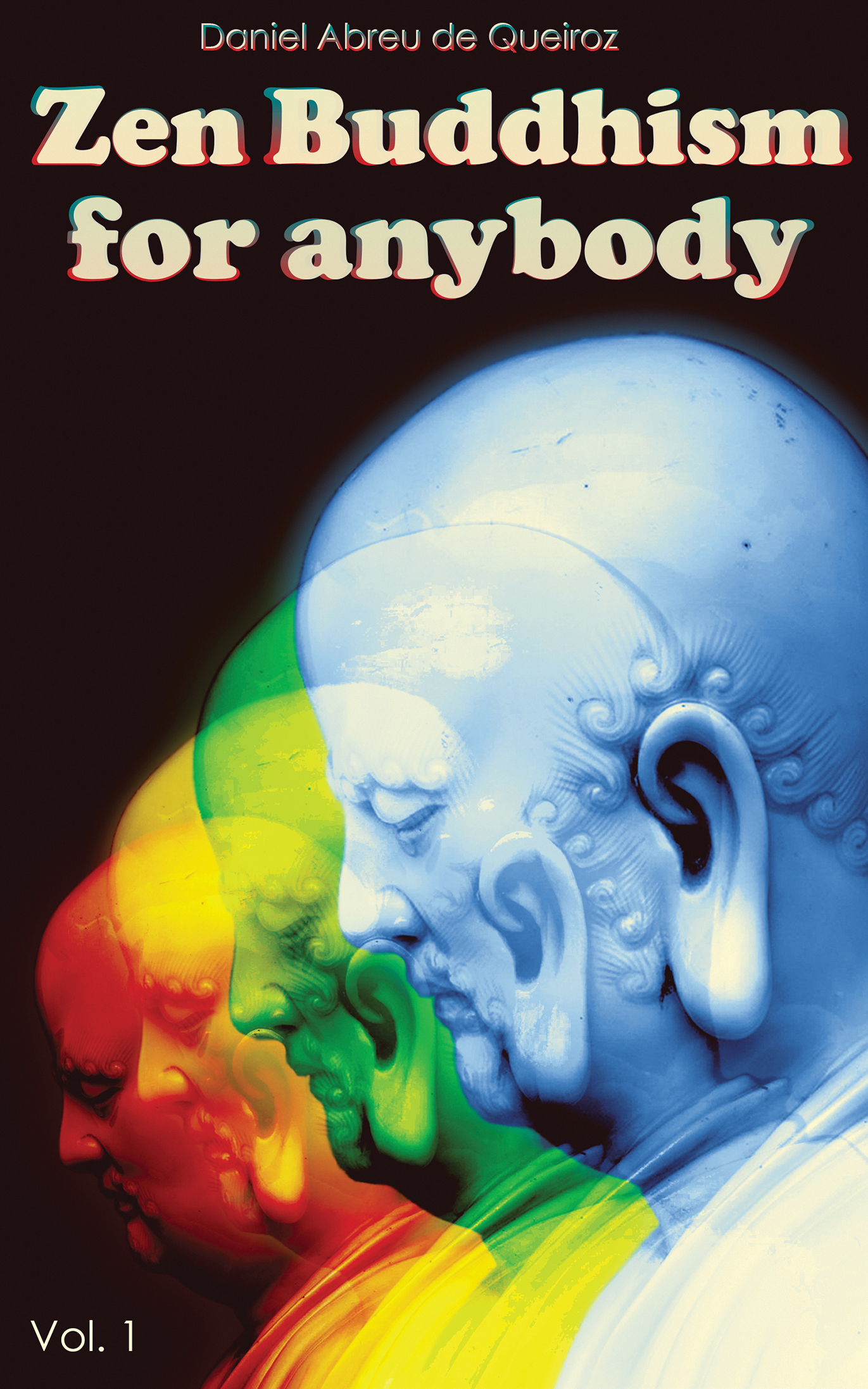For Anybody Vol. I: This body itself is Nirvana Belo Horizonte Authors Edition 2021 2019, Daniel Abreu de Queiroz Original title: Zen Budismo para todos Vol. 1: Esse prprio corpo o Nirvana 2021, English translation: Daniel Abreu de Queiroz Version 2.1 (Many thanks to Roland Creswell! A fter reading vol. 2, he also read this first one and helped me to fix a lot of English mistakes! This motivated me to revise the book and to improve it as I could.) ISBN: 978-65-00-28483-6 Cover art: Digital production with detail from (Bodhidharma in meditation), by an unknown author in China 7th century. Every image in this book was taken from the Public Access area at The Metropolitan Museum of Art. for anybody
Intro
_print.jpg)
Autumn Moon at Miyozaki (Miyozaki no shugetsu) Utagawa Yoshitora Japan (1861) The moon is ever the same for all of us, but if you point your finger at it from a determinate place and time a copy of that finger wont necessarily point at the same moon, when viewed from different places and at different times; by different people, with different personal achievements and obstructions blooming different perspectives.
The words and the texts in the practice of Zen Buddhism are considered fingers pointing at the moon (of transcendental wisdom). It is for this reason that we are constantly warned not to get obsessed with the pointing fingers (sniffing on them with the nose of our language), but instead to discover, with the eyes in our hearts, the non-linguistic moon at which those fingers point. The texts gathered in this volume are fingers pointing at the moon. By their multiplicity in origin, shape and approach, we hope to reach each and every one of the readers in their own personal coordinates with at least one text (but hopefully with many) that will lead them to that feeling of drinking a delicious nectar; a pleasure so characteristic of furthering our understanding on Zen Buddhism. The following chains of ideas were either a spark for the sudden enlightenment of a student, or a recorded expression from a renowned master. Very frequently, both characteristics are present in a single text; because the acts and expressions from the masters have guided a lot of practitioners towards enlightenment and, at the same time, the most illustrative episodes from students reaching enlightenment have become tools, in the hands of the masters, to illustrate the Way in the spiritual training of their own disciples.
We offer here a profusion of these texts; both in prose and verse. You will be introduced to a lot of stories, anecdotes, quotes, remixes, sutras (the canonical texts from Buddhism), tokinoge (verses expressing the moment of enlightenment), koans (special riddles, used by some Zen masters in the training and evaluating of their students), yuige (farewell verses at the moment of passing), jakugo (the masters commentaries to the records of their predecessors), mondo (a form of Zen question-and-answer)... There are also a few illustrations, taken from the Public Access area at the The Metropolitan Museum of Art, that will hopefully facilitate, or deepen, some familiarity with the universe where Zen Buddhism was born and developed. With nothing else to say, I deliver to the world this machine gun of fingers pointing at Zen, or rather blooming from it. (Is it wrong to think of flowers as if they also pointed at the ground?) By publishing this, I hope that everybody and anybody can find their coordinates for a fuller, happier life regardless of their starting point. All the errors and mistakes in this book are my own fault.
Every merit is due to those who originally lined up the fundamental ideas in each one of these texts. Thank you. Belo Horizonte, 2019
Daniel Abreu de Queiroz
A cup of tea
We shall start with one of the most popular stories on Zen Buddhism. It happened during the latter part of the 19th century, when a Western university professor traveled to Japan and brought this story back with himself. The world in those days was very different from the one we experience today the distances meant a lot more than they do now, and the stream of information was much slower. Therefore, it was only natural that this university professor should occupy himself with various researches, covering several topics of the exotic Japanese culture.
In one of these ventures, he visited the master Nan-in; hoping to understand (from a scholarly point of view) what exactly was this nonsensical Zen, said to exert such a mysterious, pervading influence on all Japanese culture. The professor introduced himself to Nan-in and explained his intentions. As they were talking, according to custom, the master prepared some tea for his guest. While serving the tea, however, the master kept on pouring the liquid over the professors cup, even past the point when it was overflowing. Interpreting this as an oversight on the part of the master, the professor was alarmed and tried to intervene.  Sencha tea cups () Unknown author Japan (early 18th century)
Sencha tea cups () Unknown author Japan (early 18th century)
Nothing stays
Like the professor exposed to the overflowing tea cup, everybody needs to empty concepts and suppositions before approaching Zen Buddhism.

Sencha tea cups () Unknown author Japan (early 18th century)
Nothing stays
Like the professor exposed to the overflowing tea cup, everybody needs to empty concepts and suppositions before approaching Zen Buddhism.
Concepts and suppositions are nothing but linguistic entities symbolic reconstructions about Reality ; always different from Reality itself , which is the object of study in Zen. Hence, it is impossible to reproduce the spirit of Zen when approaching it with concepts. Also the word Moon has no effect over the tides. The picture of a grill will produce no barbecue. Words and images can only point at the moon; using the symbols as fingers of representation. In Buddhism, poetry has been used for many centuries in expressing the fundamentals and pointing the moon.
If prose can explain ideas in greater detail, poetry can more easily transcend ideas. For this reason, many of the texts you will find in this book are poems, or come from poems. The following one is a composition from a most beloved poet known as Ryokan (but keep in mind that well usually pay no attention whatsoever to who wrote what ; as this book is not meant for scholars and researchers. This is a book to give you a certain kind of pleasure; to inspire meditation and to empty our cups): If we say this one is pretty, We imply that one is ugly. If you want to know whats right, Youll perceive that which is wrong. Wisdom and ignorance Complete each other; It is impossible to tear Illusion apart from enlightenment.
This is a very ancient truth Its not a passing fad. You say: I want this... I want that...; Such nonsense! Ill tell you a secret: Nothing stays.
The fire
A wise person is not greedy; But a fool will always love the fire. Their field invades their neighbors. The bamboo grove? Its all mine! They push their way to embrace riches.
They gnash their teeth at horse and servant. Take a look at the ground beyond the city gates; So many graves under the pines...








![Dalaï Lama XIV. - An introduction to Buddhism: [teachings on the Four noble truths, The eight verses on training the mind and the Lamp for the path to enlightenment]](/uploads/posts/book/207935/thumbs/dala-lama-xiv-an-introduction-to-buddhism.jpg)



_print.jpg) Autumn Moon at Miyozaki (Miyozaki no shugetsu) Utagawa Yoshitora Japan (1861) The moon is ever the same for all of us, but if you point your finger at it from a determinate place and time a copy of that finger wont necessarily point at the same moon, when viewed from different places and at different times; by different people, with different personal achievements and obstructions blooming different perspectives.
Autumn Moon at Miyozaki (Miyozaki no shugetsu) Utagawa Yoshitora Japan (1861) The moon is ever the same for all of us, but if you point your finger at it from a determinate place and time a copy of that finger wont necessarily point at the same moon, when viewed from different places and at different times; by different people, with different personal achievements and obstructions blooming different perspectives.  Sencha tea cups () Unknown author Japan (early 18th century)
Sencha tea cups () Unknown author Japan (early 18th century)